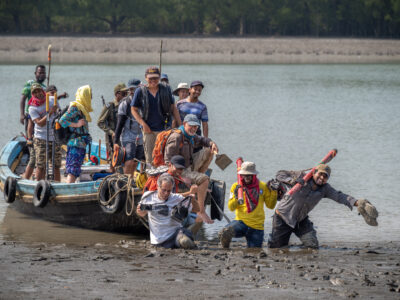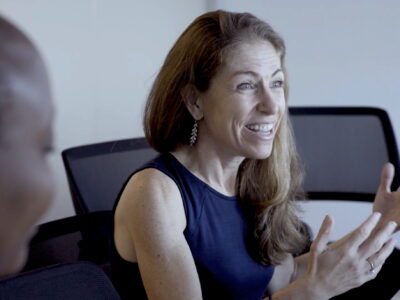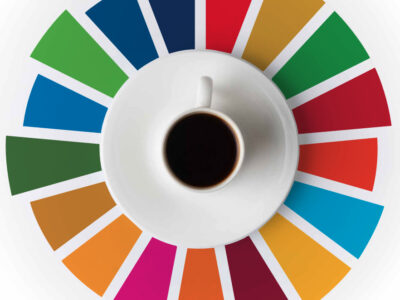What might students in a Ph.D. in Sustainable Development and Masters of Public Administration in Environmental Science and Policy program have in common? Undergraduates who attended the most recent Sustainable Development brownbag found that these students are all driven in the field of environmental sciences and are looking to connect bridges between the public, who have the questions, and the scientists, who have the answers. On December 2nd, current students in these advanced degree programs joined undergraduates in the Columbia community at a brownbag luncheon. Four students participated, including Anna Tompsett and Amir Jina from the Sustainable Development Ph.D. program, and David Katz and Joe Nyangon from the MPA-ESP program. All four shared their professional and personal experiences that lead them to their programs as well as their plans for the future. Though they had diverse experiences, there was resounding support in the room for David Katz’s statement that “interdisciplinary study is the way of the future because among different stakeholders, communication is key.”
Anna Tomsett and Amir Jina admit that there are many routes to lead to the Ph.D. program in Sustainable Development. There are those who come with specific agenda items to complete, and then those who have interests and questions and find the program to be the place where they can explore both. “I am the latter!” Anna noted. Anna, a fifth-year PhD student, worked as a civil engineer in the UK and Nigeria and studied at Imperial College London, the Universidad Politécnica de Madrid and the University of Cambridge. Her overseas experience includes work in Uganda, El Salvador, Mali and Zambia. Currently she works on a randomized field test of the impact of decentralization of decision-making in the provision of arsenic-safe water sources in Bangladesh, and on a study of the role of transport infrastructure in determining spatial patterns of economic development using historical data from the United States.
Amir, a third-year PhD student, focuses his research on climate change adaptation and the long-term social impacts of disasters in developing countries. Prior to joining the program, Amir completed an M.A. in Climate and Society from Columbia University and while in the program he had the opportunity to travel to India and Bangladesh to aid in the implementation of climate change adaptation projects. A vital tool that Anna and Amir find to be instrumental in their study of Sustainable Development is economics, as it allows them to quantify the social effects at the interface of environment and society. “The ability to measure the effect of a change and translate those effects into numbers makes it so that the information is much harder to argue with. These numbers can then be presented to policymakers to effect change,” commented Amir.
David Katz and Joe Nyangon view policy as a holistic structure that demands an understanding of the fundamental science of a problem as well as knowing how to effectively communicate the issues. David received his B.S. in Wildlife Science from both SUNY-Environmental Science and Forestry and Syracuse University as a dual diploma, where he graduated cum laude in 2010. He most recently worked for Panthera, where he worked as a Research and Media Assistant saving big cats all around the world. One of his more notable projects was working with six different African countries on how to save their lion populations from over-hunting. Joseph received his Bachelor of Engineering in Environmental Engineering from the University of Nairobi and M.S. in Computing Science from the University of Greenwich in UK. Prior to joining the program, he worked with the UN Development Programme, the International Institute for Sustainable Development and the World Agroforestry Centre in various roles as energy and sustainability consultant.
What drew David and Joe to the MPA in Environmental Science and Policy is the same passion that brought Anna and Amir to the Ph.D. in Sustainable Development. These four feel that the more you know about an issue, the more you want to learn about it and the less likely you are to back away from it until you have found the most effective answer possible. This event was the last of five brownbag talks that took place during the 2011 fall semester. The brownbag events for the 2012 spring semester are currently being scheduled and will be posted on our website.
These events are hosted by Columbia’s Undergraduate Program in Sustainable Development which is an interdisciplinary program that addresses sustainable development through an understanding in the interaction between natural sciences and social systems, offered through the Earth Institute in partnership with Columbia College and the School of General Studies. Participating departments and schools of the Sustainable Development Major and Concentration include the Department of Earth and Environmental Biology; the Department of Earth and Environmental Engineering; the School of International and Public Affairs and the Mailman School of Public Health.
The Program in Sustainable Development allows students to gain the necessary skills they need to address the fundamental issues of sustainability. Whether it be navigating through complex public health situations or using analytical skills to develop solutions to water management problems, the Undergraduate Program in Sustainable Development enables students to look at progress in human well-being without causing harm to our environmental and the planet. The program benefits from the groundbreaking work of the faculty and researchers at the Earth Institute who collaborate with students in addressing fundamental sustainable development issues.
To learn more about the Undergraduate Major and Special Concentration in Sustainable Development, or for more information about, or to register for, our upcoming “Brown Bag” events hosted by the Undergraduate Program, please visit our website or contact Jessica Crespo at jcrespo@ei.columbia.edu.



